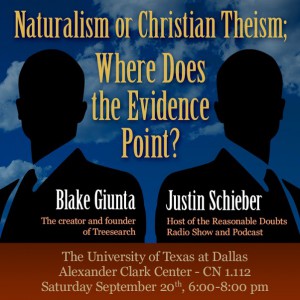Our cognitive faculties evolved to help us detect agents in our environment and to predict the content of their minds but those same faculties also generate beliefs in supernatural minds and divine agents. While this seems to suggest that religious intuitions are untrustworthy by-products of ordinary cognitive processes, Cognitive psychologists like Justin Barrett argue the existence of these “god-faculties” in the brain should not make the atheist more comfortable with their skepticism. In fact, Barrett believes they actually provide a defeater for atheism.
Counter-Apologetics / God Thinks Like You Crossover: Do Cognitive Faculties for Religious Beliefs argue for Theism or Atheism?
The fact that our cognitive faculties produce immediate, non-inferential beliefs supporting some of our most basic assumptions (an external world, the existence of mind, the validity of logic, etc.) should provide some epistemic assurances against extreme skepticism. Since our faculties seem aimed at forming true beliefs about the world, we have reason to trust them until we find evidence to the contrary. Building from this epistemlogical foundation, Justin Barrett and Kelly Clark argue we also have warrant to believe in God, since the same faculties that produce beliefs in agents and other minds also produce belief in Gods. Furthermore, Barrett insists the atheist cannot claim the mind’s god-faculties are unreliable without undercutting the foundations of a naturalistic worldview. Jeremy Beahan and Luke Galen look at the philosophy and science behind these arguemnts, and draw a differnt conclusion.
Links:
Reidian Religious Epistemology and the Cognitive Science of Religion by Kelly James Clark and Justin L. Barrett
Should CSR Give Atheists Epistemic Assurance? by Justin L. Barrett and Ian M. Church
Listen to this segment, Listen to the entire episode or subscribe to reasonable doubts for free.
Polyatheism: The Heroic Adventures of Cú Chulainn
This polyatheism is the first in a three part series on the zany adventures of the Irish mythological hero Cu Chulainn.
Listen to this segment, Listen to the entire episode or subscribe to reasonable doubts for free.
Stranger Than Fiction: Children’s Satanic Activity Book
Links:
Satanic Coloring Book distributed to Florida children (and a pdf of the book)
We are proud to offer Reasonable Doubts without advertisements and free of charge. We rely on your generosity. If you enjoyed this episode please consider donating to Reasonable Doubts to help us cover our costs.
Or subscribe and listen in iTunes or any podcast client:


 Interview: Leo Igwe
Interview: Leo Igwe

